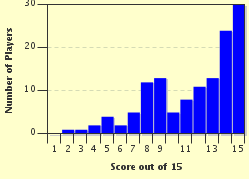Quiz Answer Key and Fun Facts
1. You know you were a kid growing up in Australia in the 70s when...
You would record songs from "Countdown" to be played back later.
What was the medium you recorded on?
2. You know you were a kid growing up in Australia in the 70s when...
Sunday night was a night the whole family watched television together. After "Countdown", "Young Talent Time" started on another channel. The closing song was always the same; we knew it by heart and we all sang along as well. What was the name of the closing song?
3. You know you were a kid growing up in Australia in the 70s when...
We weren't too worldly, but we knew how to go around the world and to walk the dog. What single item did we need to do perform these two duties?
4. You know you were a kid growing up in Australia in the 70s when...
We could recite an advertisement jingle forty years later, "We love football, meat pies, kangaroos and _______ ____." What made up the fourth quintessential Australian icon?
5. You know you were a kid growing up in Australia in the 70s when...
While the 70s were pretty carefree, we were a bit concerned about Skylab. What was Skylab?
6. You know you were a kid growing up in Australia in the 70s when...
You had to get to the shops early on Saturday morning because...?
7. You know you were a kid growing up in Australia in the 70s when...
We were just starting to think our home grown rock roll was as good as the rest of the world's. And then came songs like "The Newcastle Song" , "Shaddup your Face", and "Jump in My Car" but we sang along gleefully anyway. Who sang "Jump in My Car"?
8. You know you were a kid growing up in Australia in the 70s when...
You were given a bottle of milk to drink every day whilst at school.
How big were the bottles of milk?
9. You know you were a kid growing up in Australia in the 70s when...
You couldn't wait to get your hands on a new trend called a Sunnyboy. What was a Sunnyboy?
10. You know you were a kid growing up in Australia in the 70s when...
You was not interested in politics but after 23 years of a conservative government, it appeared every Australian was talking about the upcoming election in December 1972. What was the motto of the Australian Labor Party's Campaign?
11. You know you were a kid growing up in Australia in the 70s when...
Bicycles, which had virtually stayed the same basic style for 90 years suddenly became different. Which one of these did *NOT* feature on bicycles of the 70s?
12. You know you were a kid growing up in Australia in the 70s when...
Norm was a fat lazy slob but we all loved him. What catchphrase was Norm famous for propagating?
13. You know you were a kid growing up in Australia in the 70s when...
We didn't worry about SPF numbers when we bought sunscreen. We were more worried about getting a tan than a melanoma. What was our favourite sun tan lotion that smelt like a Pina Colada?
14. You know you were a kid growing up in Australia in the 70s when...
Our parents sent us to bed so we couldn't watch a new program on television that was not considered suitable for young eyes. What was the name of said TV show?
15. You know you were a kid growing up in Australia in the 70s when...
We all held our breath when big changes were mooted to our national sporting calendar. What was the form of these massive proposed changes?
Source: Author
1nn1
This quiz was reviewed by FunTrivia editor
bloomsby before going online.
Any errors found in FunTrivia content are routinely corrected through our feedback system.

